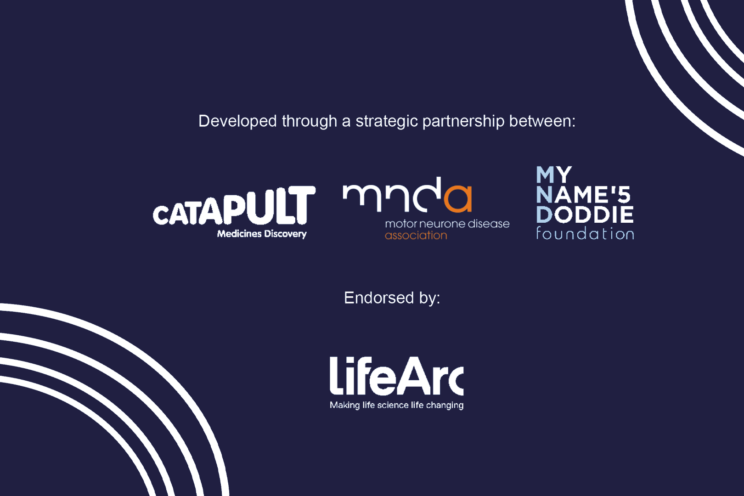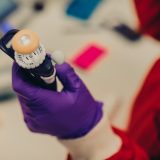The outputs of a year-long project that has brought together leading researchers, clinicians, industry experts and people living with motor neuron disease (MND) have been published today. The white paper “Guiding principles for drug discovery and development in amyotrophic lateral sclerosis” outlines a consensus-based approach to de-risk clinical trials of novel therapeutics by an enhanced evidenced-based approach to pre-clinical studies.
Despite recent leaps forward in our understanding of MND biology, treatment options for this devastating condition remain limited. To ensure future drug discovery and development efforts have the best chance of successfully translating from the lab to the clinic, Medicines Discovery Catapult, MND Association and My Name’5 Doddie Foundation have partnered to generate new guidance for the MND drug discovery community.
A cross-sector working group of MND experts was convened by MND Association and My Name’5 Doddie Foundation and coordinated by Medicines Discovery Catapult throughout 2022. The group examined barriers to translating basic science into effective therapies for MND and suggested guiding principles for future research. These principles were introduced to international stakeholders across the MND global community for comment through a Delphi survey and online workshop to gain community consensus. You can read more about the workshop here.
Prof Kevin Talbot, Head of Department and Professor of Motor Neuron Biology at the University of Oxford, who played a leading role in the development of the white paper said:
“This white paper represents the work of a cross-sector group of MND experts in academia and industry that have combined to agree a consensus on the key reasons for poor translational outcomes in MND. We have generated recommendations for the optimisation and conduct of pre-clinical studies to improve confidence that a drug will show efficacy in human trials. We hope this guidance will catalyse high quality pre-clinical drug discovery efforts and create a shared vision for all stakeholders involved in MND drug discovery research.”
The Guiding Principles underpin a new £5m funding call from LifeArc, also announced today, which aims to identify medicines used in other diseases and repurpose them for MND.
Paul Wright, MND Translational Challenge Leader at LifeArc, who was a member of the working group, said:
“It’s critical that we embed best practice in all aspects of our research programmes, which is why we’re excited to align our new £5 million drug repurposing funding call to the Guiding Principles for ALS Drug Discovery and Development. By partnering with the MND community to fund the most robust science, we will increase the chance of new treatments reaching people living with MND, faster.”
Jessica Lee, now Director of Research at My Name’5 Doddie Foundation, led the development of this guidance in her previous role at Medicines Discovery Catapult. She said:
“This project was a huge collaborative effort that brought together leading minds over a year-long period. We are so grateful for the time and energy of all members of the expert working group and everyone that attended the online workshop and completed the Delphi survey. We hope that this new guidance will raise the bar for pre-clinical MND research and help to accelerate the development of effective new treatments.”
Dr Nicola Heron, Chief Strategy Officer at Medicines Discovery Catapult, said:
“MND is a devastating disease with limited treatment options, so it is essential the drug discovery community works together to help change this. These Guiding Principles, released today, are the result of a collaborative effort to help innovators find new treatments and improve patient outcomes.”
Dr Brian Dickie MBE, Director of Research at the MND Association, said:
“As with many other neurodegenerative diseases, the history of MND clinical trials is filled with negative or, at best, modestly positive outcomes. With many potential drug targets emerging from the explosion of new knowledge about MND in recent years, the Guiding Principles will improve the translation of new therapies from the lab, help the drug development community to ‘pick winners’ for clinical trials and hopefully result in more effective therapies for this devastating disease.”



